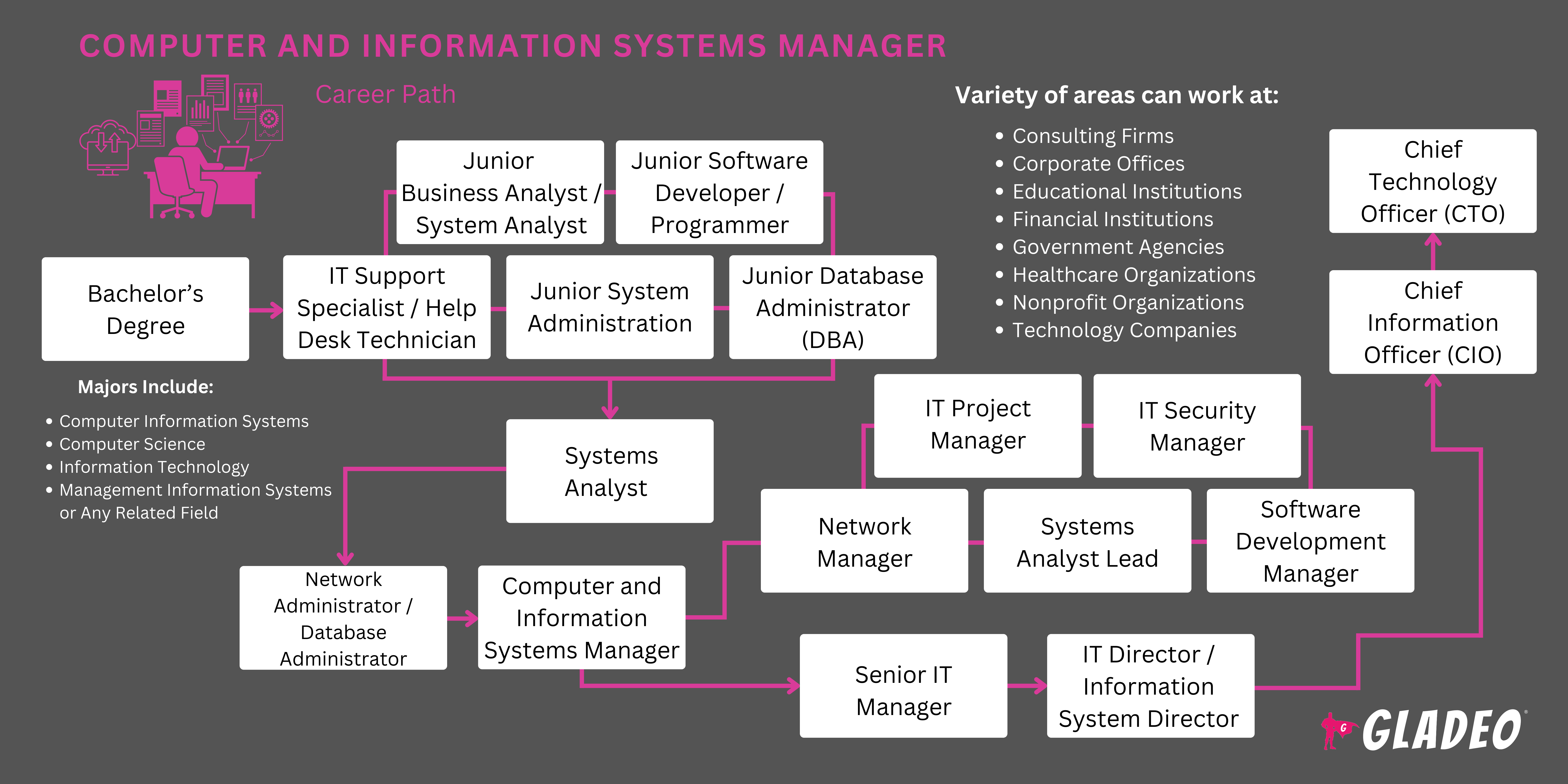Spotlights
IT Manager, Information Systems Director, Technology Manager, Network Operations Manager, IT Project Manager, Chief Information Officer (CIO)
Computer and Information Systems Managers are the strategic thinkers and problem-solvers who keep an organization’s technology running smoothly—and help it grow into the future. They plan, coordinate, and direct computer-related activities, ensuring that networks, software, and security systems meet the organization’s goals.
These managers oversee teams of IT professionals, including programmers, analysts, and support specialists. They help decide what technology to buy, how to implement new systems, and how to protect company data from cyber threats. Whether managing a hospital’s patient data system, a retailer’s online store, or a government agency’s network, they make sure everything stays secure, efficient, and reliable.
It’s a career for people who love technology but also enjoy leadership—balancing innovation with real-world business needs!
- Leading teams that drive digital transformation and innovation.
- Solving complex problems that improve efficiency and productivity.
- Earning competitive salaries and benefits in a high-demand field.
- Working across industries—from finance and healthcare to entertainment and government.
- Staying at the cutting edge of technology, cybersecurity, and data management.
Working Schedule
Most Computer and Information Systems Managers work full-time in offices or hybrid environments. Typical hours are 40–50 per week, though nights or weekends may be needed during system upgrades or emergencies.
Typical Duties
- Plan and coordinate computer system installations and upgrades.
- Supervise IT staff and set department goals and budgets.
- Analyze the organization’s technology needs and recommend solutions.
- Oversee cybersecurity measures and data protection strategies.
- Evaluate new technologies and software for cost and efficiency.
- Ensure network and system reliability.
- Collaborate with executives to align IT goals with business objectives.
Additional Responsibilities
- Develop IT policies, security standards, and disaster recovery plans.
- Manage vendor relationships and negotiate technology contracts.
- Train staff on new technologies and security protocols.
- Monitor system performance and respond to downtime or breaches.
- Ensure compliance with data privacy laws and industry regulations.
- Stay current on emerging technologies, such as AI, blockchain, and cloud computing.
A day in the life of a Computer and Information Systems Manager starts with checking system dashboards, reviewing overnight reports, and addressing any network or security alerts. They might attend a morning meeting with department heads to discuss technology goals—such as migrating data to the cloud or improving cybersecurity measures.
Throughout the day, they coordinate with their IT teams, review project timelines, and make decisions about hardware or software purchases. They may troubleshoot issues, oversee system updates, or meet with vendors to evaluate new products.
In larger organizations, the manager also acts as a bridge between the tech team and upper management—translating technical details into business outcomes. By the end of the day, they review progress on ongoing projects and plan for upcoming upgrades or security audits.
Soft Skills
- Leadership and team management
- Critical thinking and problem-solving
- Communication and presentation
- Strategic planning
- Decision-making
- Adaptability and continuous learning
- Time management
- Customer service orientation
Technical Skills
- Network and systems administration
- Cybersecurity management
- Database and cloud computing knowledge
- Project management tools (e.g., Agile, Scrum, PMP)
- Software development understanding
- IT budgeting and procurement
- Data analytics and business intelligence tools
- Knowledge of compliance frameworks (HIPAA, GDPR, ISO)
- IT Project Managers – Oversee specific technology projects from planning to completion.
- Network and Computer Systems Managers – Handle company-wide hardware and networking systems.
- Information Security Managers – Protect systems and data from cyber threats.
- Chief Information Officers (CIOs) – Lead overall IT strategy and innovation at the executive level.
- Database Managers – Supervise teams managing data storage and retrieval systems.
- Corporations (finance, retail, manufacturing, technology)
- Healthcare institutions and hospitals
- Government agencies and public sector offices
- Schools, colleges, and universities
- IT consulting firms
- Nonprofit organizations
The role often comes with high responsibility—especially during system failures, cyberattacks, or major software rollouts. Managers may need to work long hours and be “on call” during emergencies. They must balance competing priorities and tight budgets while keeping systems secure and up to date.
However, the payoff is a fulfilling, respected career at the center of digital transformation—where your decisions directly impact how smoothly an organization runs.
- Cloud Computing: Managing hybrid cloud infrastructures has become a key skill.
- Cybersecurity: Demand for managers with strong data protection strategies is rising.
- Artificial Intelligence: Integrating AI tools into business processes is reshaping IT management.
- Remote Work Tech: Overseeing secure and efficient work-from-home systems is now standard.
- Data Analytics: Managers who can interpret data trends are in high demand.
Many future Computer and Information Systems Managers loved solving puzzles, building computers, or learning how software worked. They were the “tech helpers” among their friends or family—the ones who fixed Wi-Fi issues or customized gaming PCs. Others enjoyed organizing group projects, leading teams, or creating digital solutions for school clubs or small businesses.
- A bachelor’s degree in computer science, information technology, management information systems (MIS), or a related field is typically required.
- Many managers also hold a master’s degree in information systems (MSIS) or an MBA with a technology focus.
- Relevant work experience (5–10 years in IT roles such as network administrator, systems analyst, or software developer) is often necessary before moving into management.
Common Courses Include:
- Computer networking and security
- Systems analysis and design
- Database management
- Project management
- Business communication
- Cloud computing
- Information systems strategy
- IT ethics and cybersecurity law
Certifications That Can Boost Your Career:
- Certified Information Systems Security Professional (CISSP)
- Certified Information Systems Manager (CISM)
- Project Management Professional (PMP)
- CompTIA Network+ or Security+
- Microsoft Certified: Azure Administrator
- AWS Certified Solutions Architect
- Take computer science, math, and business courses.
- Join your school’s coding club, robotics team, or IT support group.
- Volunteer to help teachers or local nonprofits with computer setup or troubleshooting.
- Explore dual-enrollment or early college programs offering IT courses.
- Learn programming languages such as Python, Java, or C++.
- Build small tech projects—like websites, mobile apps, or home networks.
- Participate in internships or job shadowing with IT departments.
- Take leadership roles in student organizations to build teamwork and management skills.
- Stay current with tech trends through podcasts, YouTube channels, and online tutorials.
- Accreditation by ABET or recognized technology accrediting bodies.
- Hands-on experience with current hardware, software, and cybersecurity tools.
- Internship or co-op opportunities with local businesses or IT firms.
- Strong partnerships with employers and high job placement rates.
Sample Programs:
- Western Governors University – B.S. in Information Technology Management
- Purdue Global – Master’s in Information Technology
- University of Maryland Global Campus – B.S. in Computer Networks and Cybersecurity
- DePaul University – MBA in Information Systems

- Search sites like LinkedIn, Indeed, Dice, and TechCareers for “IT Manager,” “Systems Analyst,” or “IT Project Coordinator” roles.
- Gain experience as an IT support specialist, help desk technician, or network administrator first.
- Showcase leadership experience, certifications, and technical projects on your résumé.
- Prepare to discuss how you’ve solved technical problems, led teams, or managed projects.
- Network with professors, IT professionals, and alumni from your program for referrals or mentorship.
- Stay open to entry-level management or assistant roles to build credibility.
- Create a professional LinkedIn profile highlighting your technical and soft skills.
- Develop a digital portfolio that includes coding projects, system designs, or IT case studies.
- Attend technology job fairs, hackathons, or local tech meetups to meet employers.
- Apply for internships or apprenticeships in IT departments to gain real-world experience.
- Ask for recommendation letters from professors or supervisors who can speak to your leadership and problem-solving skills.
- Practice answering behavioral interview questions focused on teamwork, communication, and decision-making.
- Learn basic project management tools like Jira, Trello, or Asana to demonstrate readiness for team coordination.
- Stay current with emerging trends in cybersecurity, cloud computing, and data analytics—topics often discussed in interviews.
- Be willing to relocate or work flexible hours at the start of your career to expand your opportunities.
- Earn advanced certifications such as PMP (Project Management Professional), CISM (Certified Information Security Manager), or AWS Certified Solutions Architect to strengthen your credentials.
- Pursue a master’s degree in Information Systems or an MBA with a technology focus to qualify for senior management roles.
- Take on progressively larger projects that involve budgeting, cross-department collaboration, and system integration.
- Volunteer to lead new technology initiatives or pilot programs in your organization.
- Build strong communication and leadership skills—these are just as important as technical expertise.
- Mentor junior IT staff to demonstrate your ability to train and guide others.
- Keep up with new technologies such as artificial intelligence, machine learning, and cloud computing.
- Attend industry conferences, webinars, and workshops to expand your professional network.
- Join professional associations like ISACA, CompTIA, or Project Management Institute (PMI) for ongoing learning opportunities.
- Learn about business operations, finance, and strategic planning to better align IT goals with company objectives.
- Publish articles or give presentations on IT best practices to build a reputation as a thought leader.
- Seek lateral moves into roles like IT Project Manager, Systems Architect, or Cybersecurity Manager to broaden your experience.
- Work toward executive positions such as Chief Information Officer (CIO) or Chief Technology Officer (CTO) once you’ve gained extensive management experience.
- Continue professional development through online platforms like Coursera, edX, or LinkedIn Learning to stay competitive.
- Develop expertise in emerging areas such as data analytics, digital transformation, or enterprise architecture.
Websites
- Bureau of Labor Statistics: Computer and Information Systems Managers
- CompTIA.org
- ISACA.org (Information Systems Audit and Control Association)
- PMI.org (Project Management Institute)
- CIO.com
- TechCareers.com
- Cyberseek.org
- Indeed.com
- LinkedIn Learning
- Dice.com
- TechTarget.com
- InformationWeek.com
- Computerworld.com
- Glassdoor.com
- Monster.com
- ZDNet.com
- CareerOneStop.org
- O*NET OnLine
- Coursera.org
- edX.org
Books
- IT Strategy: Issues and Practices by McKeen & Smith
- The Phoenix Project by Gene Kim, Kevin Behr & George Spafford
- Managing the Information Technology Resource by Jerry Luftman
If you love technology but prefer a less managerial or less high-pressure role, consider these alternatives:
- Network Administrator
- Systems Analyst
- Database Administrator
- Cybersecurity Specialist
- IT Project Coordinator
- Cloud Solutions Architect
- Business Systems Analyst
Newsfeed

Featured Jobs

Online Courses and Tools








